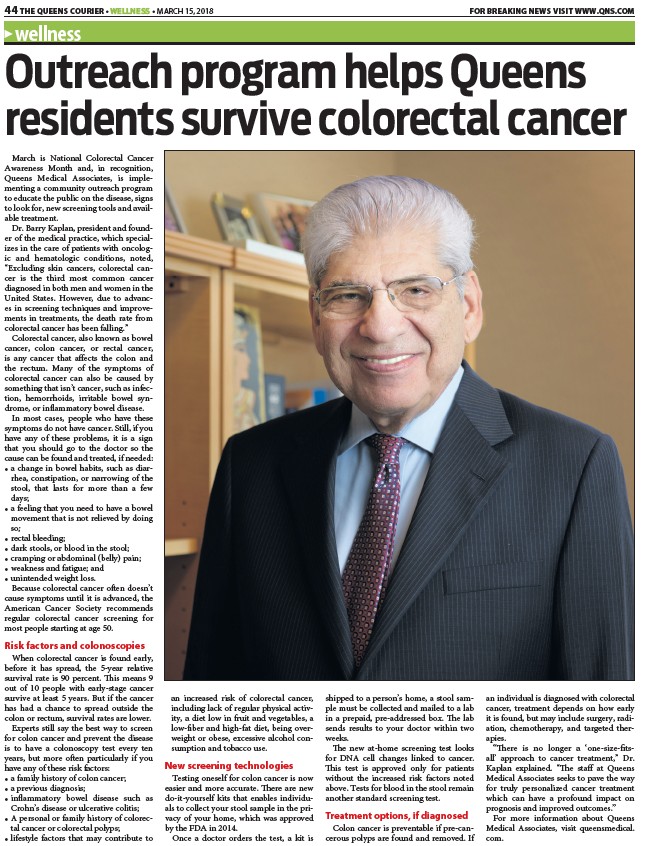
44 THE QUEENS COURIER • WELLNESS • MARCH 15, 2018 FOR BREAKING NEWS VISIT WWW.QNS.COM
wellness
Outreach program helps Queens
residents survive colorectal cancer
March is National Colorectal Cancer
Awareness Month and, in recognition,
Queens Medical Associates, is implementing
a community outreach program
to educate the public on the disease, signs
to look for, new screening tools and available
treatment.
Dr. Barry Kaplan, president and founder
of the medical practice, which specializes
in the care of patients with oncologic
and hematologic conditions, noted,
“Excluding skin cancers, colorectal cancer
is the third most common cancer
diagnosed in both men and women in the
United States. However, due to advances
in screening techniques and improvements
in treatments, the death rate from
colorectal cancer has been falling.”
Colorectal cancer, also known as bowel
cancer, colon cancer, or rectal cancer,
is any cancer that aff ects the colon and
the rectum. Many of the symptoms of
colorectal cancer can also be caused by
something that isn’t cancer, such as infection,
hemorrhoids, irritable bowel syndrome,
or infl ammatory bowel disease.
In most cases, people who have these
symptoms do not have cancer. Still, if you
have any of these problems, it is a sign
that you should go to the doctor so the
cause can be found and treated, if needed:
• a change in bowel habits, such as diarrhea,
constipation, or narrowing of the
stool, that lasts for more than a few
days;
• a feeling that you need to have a bowel
movement that is not relieved by doing
so;
• rectal bleeding;
• dark stools, or blood in the stool;
• cramping or abdominal (belly) pain;
• weakness and fatigue; and
• unintended weight loss.
Because colorectal cancer oft en doesn’t
cause symptoms until it is advanced, the
American Cancer Society recommends
regular colorectal cancer screening for
most people starting at age 50.
Risk factors and colonoscopies
When colorectal cancer is found early,
before it has spread, the 5-year relative
survival rate is 90 percent. Th is means 9
out of 10 people with early-stage cancer
survive at least 5 years. But if the cancer
has had a chance to spread outside the
colon or rectum, survival rates are lower.
Experts still say the best way to screen
for colon cancer and prevent the disease
is to have a colonoscopy test every ten
years, but more oft en particularly if you
have any of these risk factors:
• a family history of colon cancer;
• a previous diagnosis;
• infl ammatory bowel disease such as
Crohn’s disease or ulcerative colitis;
• A personal or family history of colorectal
cancer or colorectal polyps;
• lifestyle factors that may contribute to
an increased risk of colorectal cancer,
including lack of regular physical activity,
a diet low in fruit and vegetables, a
low-fi ber and high-fat diet, being overweight
or obese, excessive alcohol consumption
and tobacco use.
New screening technologies
Testing oneself for colon cancer is now
easier and more accurate. Th ere are new
do-it-yourself kits that enables individuals
to collect your stool sample in the privacy
of your home, which was approved
by the FDA in 2014.
Once a doctor orders the test, a kit is
shipped to a person’s home, a stool sample
must be collected and mailed to a lab
in a prepaid, pre-addressed box. Th e lab
sends results to your doctor within two
weeks.
Th e new at-home screening test looks
for DNA cell changes linked to cancer.
Th is test is approved only for patients
without the increased risk factors noted
above. Tests for blood in the stool remain
another standard screening test.
Treatment options, if diagnosed
Colon cancer is preventable if pre-cancerous
polyps are found and removed. If
an individual is diagnosed with colorectal
cancer, treatment depends on how early
it is found, but may include surgery, radiation,
chemotherapy, and targeted therapies.
“Th ere is no longer a ‘one-size-fi tsall’
approach to cancer treatment,” Dr.
Kaplan explained. “Th e staff at Queens
Medical Associates seeks to pave the way
for truly personalized cancer treatment
which can have a profound impact on
prognosis and improved outcomes.”
For more information about Queens
Medical Associates, visit queensmedical.
com.